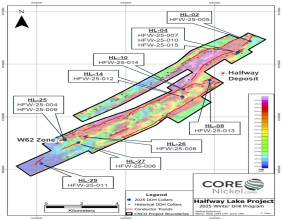Highlights
- Drone Delivery Canada designs and implements commercial drone logistics platforms with integrated software and hardware components.
- The company’s turnkey system includes industrial drones, depot infrastructure, and automated battery management.
- It represents a specialized entry within tech-focused profiles often compared among the best canadian stocks.
Drone Delivery Canada Corp. (TSXV:FLT) operates within the logistics technology segment, offering drone-based infrastructure systems that support short-distance and last-mile delivery. The company’s platform includes hardware, software, and systems integration, tailored to commercial logistics applications in Canada and selected international locations. With its full-stack delivery ecosystem, the company plays a role in shaping modern transportation technology.
Participants in emerging sectors like aerial logistics are increasingly referenced in evaluations of best canadian stocks due to their focus on infrastructure adaptability and digital integration.
Integrated Drone-Based Delivery Framework
Drone Delivery Canada provides an end-to-end solution for autonomous cargo transport. The ecosystem includes industrial-grade drones capable of flying predefined routes, along with DroneSpot depots that act as secure landing and charging stations. Each element is supported by battery automation and system-wide integration.
FLYTE, the proprietary software platform, oversees drone flight control, communication, and depot interaction. The software coordinates aerial traffic and syncs logistics steps across endpoints. Solutions that pair unmanned hardware with centralized logistics management platforms are becoming essential components in next-generation delivery systems.
Technology Components and Automation Features
The platform incorporates a range of technical subsystems including detect-and-avoid radar technology, route automation, and telemetry feedback. These features allow the system to operate safely in controlled and semi-autonomous environments. The integrated battery management function supports scheduled energy use and recharging coordination across multiple drone units.
Each hardware component is embedded within a broader communication framework that supports mission command and operational feedback. These engineered systems enable consistent function under pre-set conditions, and represent design principles now common in the logistics automation space.
Scalability and Commercial Application
Drone Delivery Canada’s technology is geared toward structured logistics needs in sectors such as healthcare, remote community supply, industrial campuses, and emergency response. The company’s solutions are designed to work within both fixed-route and dynamic dispatch environments. Its model allows organizations to reduce delivery times and support operations in areas with limited infrastructure.
The modular platform can be scaled for regional or site-specific use cases. Firms that deploy self-managed logistics platforms often earn attention in tech-focused evaluations of best canadian stocks, particularly those that provide infrastructure rather than direct retail logistics.
Engineering and Deployment Reach
With operational activity focused in Canada, Drone Delivery Canada also supports limited overseas engagement in testing and commercial pilots. The company partners with regulatory authorities and commercial clients to match its technology to compliance standards. Field implementation and system refinement occur through structured pilot programs and managed route development.
Its hardware-software integration and infrastructure-first model continue to define its presence within logistics system innovation. Companies offering bespoke transportation platforms with scalable architecture are increasingly aligned with tech sector attributes recognized in best canadian stocks discussions.




